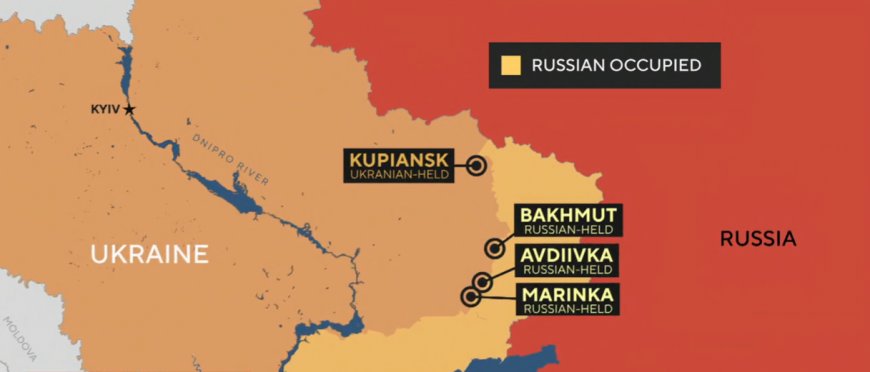U.S. giving Ukraine $300 million in weapons even as Pentagon lacks funds to replenish stockpile
The Pentagon will rush about $300 million in weapons to Ukraine

The Pentagon will rush about $300 million in weapons to Ukraine after finding some cost savings in its contracts, even though the military remains deeply overdrawn and needs at least $10 billion to replenish all the weapons it has pulled from its stocks to help Kyiv in its desperate fight against Russia , senior U.S. officials said Tuesday.
It's the Pentagon's first announced security package for Ukraine since December , when it acknowledged it was out of replenishment funds. It wasn't until recent days that officials publicly acknowledged they weren't just out of replenishment funds, but $10 billion overdrawn.
The replenishment funds have allowed the Pentagon to pull existing munitions, air defense systems and other weapons from its reserve inventories under presidential drawdown authority, or PDA, to send to Ukraine and then put contracts on order to replace those weapons.

National security adviser Jake Sullivan announced the new package at the White House press briefing and said it consists of artillery rounds to help Ukraine repel Russian advances.
One of the senior defense officials who briefed reporters said the package represented a "one-time shot" — unless Congress passes a stalled supplemental spending bill that includes roughly $60 billion in military aid for Ukraine, or more cost savings are found. It is expected to include anti-aircraft missiles, artillery rounds and armor systems, the official said.
The aid announcement comes as Polish leaders are in Washington to press the U.S. to break its impasse over replenishing funds for Ukraine at a critical moment in the war. Polish President Andrzej Duda met Tuesday with Democratic and Republican leaders in the House and Senate and was to meet with President Biden later in the day.
House Speaker Mike Johnson has so far refused to bring the $95 billion package, which includes aid for Ukraine, Israel and Taiwan, to the floor. Seeking to put pressure on the Republican speaker, House Democrats have launched a long-shot effort to force a vote through a discharge petition. The seldom-successful procedure would require support from a majority of lawmakers, or 218 members, to move the aid package to a vote.
Ukraine's situation has become more dire, with units on the front line rationing munitions as they face a vastly better supplied Russian force. Ukrainian President Volodymyr Zelenskyy has repeatedly implored Congress for help, but House Republican leadership has not been willing to bring the Ukraine aid to the floor for a vote, saying any aid must first address border security needs.
Pentagon officials said Monday during budget briefing talks they were counting on the supplemental to cover the $10 billion replenishment hole.
"If we don't get the $10 billion we would have to find other means," Deputy Defense Secretary Kathleen Hicks said. "Right now we're very much focused on the need for that supplemental."
The senior defense officials who briefed reporters said the Pentagon was able to get cost savings of roughly $300 million in earlier Ukraine contracts and, given the battlefield situation, decided to use those savings to go ahead and send more weapons. The officials said the cost savings basically offset the new package and keep the replenishment spending underwater at $10 billion.
This is the second time in less than nine months that the Pentagon has "found" money to use for additional weapons shipments to Ukraine. Last June, defense officials said they had overestimated the value of the weapons the U.S. had sent to Ukraine by $6.2 billion over the past two years.
At the time, Pentagon officials said a review found that the military services used replacement costs rather than the book value of equipment that was pulled from Pentagon stocks and sent to Ukraine. The discovery resulted in a surplus that the department used for presidential drawdown packages until the end of December.
The United States has committed more than $44.9 billion in security assistance to Ukraine since the beginning of the Biden administration, including more than $44.2 billion since the beginning of Russia's invasion on Feb. 24, 2022.
The Pentagon is $10 billion overdrawn in the replenishment account in part due to inflationary pressures, and in part because the new systems the Pentagon is seeking to replace the old systems with cost more, such as the upcoming Precision Strike Missile, or PrSM, which the Army is buying to replace the long-range Army Tactical Missile System, or ATACMS.
The vast majority of those munitions have come from Army stockpiles due to the nature of the conventional land war in Ukraine.
The months without further shipments of U.S. support have hurt operations, and Ukrainian troops withdrew from the eastern city of Avdiivka last month, where outnumbered defenders had withheld a Russian assault for four months.
CIA Director William Burns told Congress that entire Ukrainian units have told him in recent days of being down to their last few dozen artillery shells and other ammunition. Burns called the retreat from Avdiivka a failure of ammunition resupply, not a failure of Ukrainian will.

 Phương Nhung
Phương Nhung 





